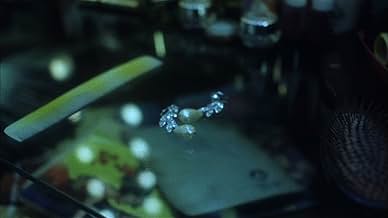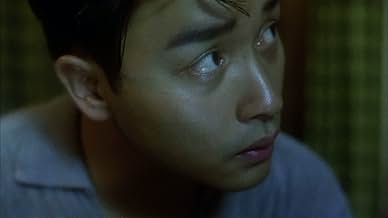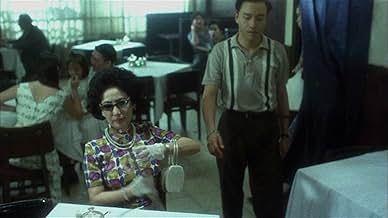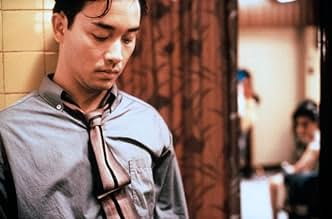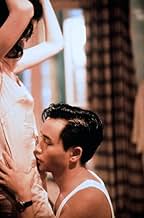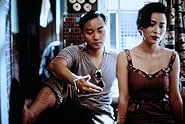AVALIAÇÃO DA IMDb
7,4/10
27 mil
SUA AVALIAÇÃO
Um homem tenta descobrir quem é sua verdadeira mãe depois que a mulher que o criou lhe diz a verdade.Um homem tenta descobrir quem é sua verdadeira mãe depois que a mulher que o criou lhe diz a verdade.Um homem tenta descobrir quem é sua verdadeira mãe depois que a mulher que o criou lhe diz a verdade.
- Prêmios
- 17 vitórias e 9 indicações no total
Rebecca Pan
- Rebecca
- (as Tik-Wa Poon)
Tony Leung Chiu-wai
- Chow Mo-wan
- (as Tony Chiu Wai Leung)
- Direção
- Roteiristas
- Elenco e equipe completos
- Produção, bilheteria e muito mais no IMDbPro
Avaliações em destaque
There is an unpolished, raw, kind of grimy feeling to this film, one which maybe fits the sad, lonely little lives of these characters, few of whom are likeable. A young playboy (Leslie Cheung) who "hates work" treats a couple of women like disposable objects, and yet they can't seem to stop loving him. It's a type of story I'm not all that fond of, even if we gradually understand one of the things that seriously damaged him, and maybe made him into the self-centered asshole we see before us. His mother gave him up for adoption, and his stepmother only took him so she could get a regular paycheck. It was quite hard to empathize with him though, and I disliked the misogynistic overtones of the film. Even his nerdy friend gets in on it, slapping his second girlfriend (Carina Lau) around in the rain after she's been abandoned. My favorite moment was when a kind police officer tries to talk some sense into the first girlfriend (Maggie Cheung), and after they part, he narrates:
"I never really thought she'd call. But every time I passed by the phone booth, I'd stand there for a while. Maybe she's all right and she made it back to Macao. Or maybe she just needed someone to help her through that one night. Soon after that, my mother passed away, and I became a sailor."
The film desperately needed more humanizing touches like that, or some level of self-reflection or philosophy deeper than its bird metaphor. The painting of emptiness and loneliness that Wong Kar-wai gives us is undercut without it, though I did like some of the artistry in his camera work. Oh, and if you're as puzzled as I was about the character seen at the very end, it's a somewhat random/minor character who was meant to be the main character of the second part of the story, a film which was never made. Somehow the meaninglessness of that fits, though I'm not sure it's in a good way.
"I never really thought she'd call. But every time I passed by the phone booth, I'd stand there for a while. Maybe she's all right and she made it back to Macao. Or maybe she just needed someone to help her through that one night. Soon after that, my mother passed away, and I became a sailor."
The film desperately needed more humanizing touches like that, or some level of self-reflection or philosophy deeper than its bird metaphor. The painting of emptiness and loneliness that Wong Kar-wai gives us is undercut without it, though I did like some of the artistry in his camera work. Oh, and if you're as puzzled as I was about the character seen at the very end, it's a somewhat random/minor character who was meant to be the main character of the second part of the story, a film which was never made. Somehow the meaninglessness of that fits, though I'm not sure it's in a good way.
Sublime suspension.
A very satisfying affair: here's the first project where Kar-Wai Wong found his groove with the Spanish notion of metastory, the story about how one hesitates in resolving what they see in life. And how that is a matter of touch. And how touch is word and how one can touch and speak with the eye.
The first project with Doyle. And with Maggie. In a way, the first version of "Mood/2046." I think no one understands cinematically suspended longing like this man. When you enter this, you enter a space where everything is connected, every connection is passionately loaded and seen. But there is no logic, no comprehension, no future. Ever.
Its anti-love but fulfilling nonetheless. Its empty in a rich way. Its about created selves in the French New Wave sense, but those selves then being honestly inhabited.
If you love, really love, it has to rest on the earth in some way. There seem to be only a few ways to rest, the usual one being a matter of anchors and roots. This is different, a matter of frictionless liquidity a local zone of antigravity where the love seems fixed by never really touches the planet. There are several metaphors in the story along these lines.
We may not have the courage to love in this way even if we are among the few who chance love at all. But it is a rather sublime visit, this.
Ted's Evaluation -- 3 of 3: Worth watching.
A very satisfying affair: here's the first project where Kar-Wai Wong found his groove with the Spanish notion of metastory, the story about how one hesitates in resolving what they see in life. And how that is a matter of touch. And how touch is word and how one can touch and speak with the eye.
The first project with Doyle. And with Maggie. In a way, the first version of "Mood/2046." I think no one understands cinematically suspended longing like this man. When you enter this, you enter a space where everything is connected, every connection is passionately loaded and seen. But there is no logic, no comprehension, no future. Ever.
Its anti-love but fulfilling nonetheless. Its empty in a rich way. Its about created selves in the French New Wave sense, but those selves then being honestly inhabited.
If you love, really love, it has to rest on the earth in some way. There seem to be only a few ways to rest, the usual one being a matter of anchors and roots. This is different, a matter of frictionless liquidity a local zone of antigravity where the love seems fixed by never really touches the planet. There are several metaphors in the story along these lines.
We may not have the courage to love in this way even if we are among the few who chance love at all. But it is a rather sublime visit, this.
Ted's Evaluation -- 3 of 3: Worth watching.
Kar Wai Wong's 2nd feature film is considerably more abstract than his first "As Tears Go By". so if you're looking for a good first Kar Wai Wong film to watch, you should probably start there.
"Days of Being Wild" reminded me very much of the classic French book "The Stranger" by Albert Camus; in fact I wonder if Kar Wai Wong may have been influenced by that book. Both stories center around a young man who is very unemotional except at times of explosive violence. Both stories show the young man to have severe mommy issues, i.e. a disconnection from his mother resulting in never learning how to show love and caring. And in both stories, the main character follows a very existentialistic path in life. He goes wherever life may take him with no connection to people or places.
The main character is not very likable. In fact he's a downright jerk toward women. But this ties in with the story of him trying to find his mother who abandoned him when he was a child. At the same time we see the interweaving of 4 other characters: 2 girlfriends, 1 devoted friend who falls for one of the girlfriends, and a policeman who enters the story by chance. Oh yeah, there's also the young man's rich aunt (adoptive mother) and a string of men she keeps.
It may be tough keeping up with all the characters, especially when the story starts moving to different locations. Certain events may seem random, but in the end it all comes together with a very poetic thought.
If you're a cinema geek, you'll love this film for its sheer technical achievements. A lot of scenes are shot with reflections & mirrors, allowing us to see the faces of different people simultaneously (without the camera jumping back & forth to whoever is talking). For example, the camera may be on a woman while she talks to a man. He is in front of the camera with his back to us, but we see his face & expressions in the reflection of a bathroom mirror behind the woman. Yea, I'm a cinema geek so I love stuff like that. If you like little details, you'll have a great time watching "Days of Being Wild".
"Days of Being Wild" reminded me very much of the classic French book "The Stranger" by Albert Camus; in fact I wonder if Kar Wai Wong may have been influenced by that book. Both stories center around a young man who is very unemotional except at times of explosive violence. Both stories show the young man to have severe mommy issues, i.e. a disconnection from his mother resulting in never learning how to show love and caring. And in both stories, the main character follows a very existentialistic path in life. He goes wherever life may take him with no connection to people or places.
The main character is not very likable. In fact he's a downright jerk toward women. But this ties in with the story of him trying to find his mother who abandoned him when he was a child. At the same time we see the interweaving of 4 other characters: 2 girlfriends, 1 devoted friend who falls for one of the girlfriends, and a policeman who enters the story by chance. Oh yeah, there's also the young man's rich aunt (adoptive mother) and a string of men she keeps.
It may be tough keeping up with all the characters, especially when the story starts moving to different locations. Certain events may seem random, but in the end it all comes together with a very poetic thought.
If you're a cinema geek, you'll love this film for its sheer technical achievements. A lot of scenes are shot with reflections & mirrors, allowing us to see the faces of different people simultaneously (without the camera jumping back & forth to whoever is talking). For example, the camera may be on a woman while she talks to a man. He is in front of the camera with his back to us, but we see his face & expressions in the reflection of a bathroom mirror behind the woman. Yea, I'm a cinema geek so I love stuff like that. If you like little details, you'll have a great time watching "Days of Being Wild".
I guess the main reason that this is my favorite WKW movie is that it's one of the least abstract of his movies and I feel like the viewer becomes more emotionally involved with the characters because of that. The music, as always with WKW, is wonderful and the cinematography is fine, I especially like all the shots of the lush tropical forests. It isn't as beautifully photographed as many of his later films like chungking express and in the mood for love. And it doesn't feature much of the fancy techniques that WKW likes to employ in movies like fallen angels or happy together. Still I think this is my favorite of Wong Kar Wai's movies, not necessarily the best, but the one I enjoy the most. Highly Recommended.
Though it has been argued that 'A Fei Zheng Chuan' (aka 'Days of Being Wild') is the first set of the trilogy which is completed by 'Fa Yeung Nin Wa' (aka 'In the Mood For Love') and '2046', it 'looks' different from the other two films. Kar Wai uses less colour, more shadow, rain and heat and more rawness. The tone is much darker than in 'Fa Yeung Nin Wa' as the film is set in the 50s. The music is beautiful and effectively used. And, here too Kar Wai ends up making a powerful product. Though this film was a box office failure, it is an artistic victory.
'A Fei Zheng Chuan' tells the story of 6 individuals whose lives are interconnected by each character's search and struggle for an identity. It's about loneliness, unrequited love, lost love, the search for love, and how the search continues. Kar Wai clevely brings up the theme of sex (without showing any nudity). The writing is excellent and the characterization is strengthened by superb and unique performances. The late Leslie Cheung's Yuddy is not a very likable person but we do sympathize with this man and recognize him. Maggie Cheung as Su gives one of the most subtle and finest performances. Carina Lau is energetic and terrific as Mimi. Rebecca Pan gracefully downplays her part. Andy Lau's Tide and Jacky Cheung's Zeb too are relatable and the actors are nothing short of remarkable. Actually, I recognize all the characters in this film.
I loved the cinematography, especially the long shots. One of my favorite shot is the introduction of the scene that glides from the Phillipine streets to Yuddy and Tide in a lunch bar. This is one fine example of skillful camera-work. The shaky camera (which thankfully isn't overdone) and the close-ups that mostly take place during conversations and intimate moments between two characters work very well. Doyle's camera-work simply guides us through the lives of these characters.
Summing it up, 'A Fei Zheng Chuan' works on many levels. It is an excellent study of characters, it 'tells' a universal story in a poetic way and it is a fine cinematic experience.
A bird that never lands will one day suddenly seize to exist.
'A Fei Zheng Chuan' tells the story of 6 individuals whose lives are interconnected by each character's search and struggle for an identity. It's about loneliness, unrequited love, lost love, the search for love, and how the search continues. Kar Wai clevely brings up the theme of sex (without showing any nudity). The writing is excellent and the characterization is strengthened by superb and unique performances. The late Leslie Cheung's Yuddy is not a very likable person but we do sympathize with this man and recognize him. Maggie Cheung as Su gives one of the most subtle and finest performances. Carina Lau is energetic and terrific as Mimi. Rebecca Pan gracefully downplays her part. Andy Lau's Tide and Jacky Cheung's Zeb too are relatable and the actors are nothing short of remarkable. Actually, I recognize all the characters in this film.
I loved the cinematography, especially the long shots. One of my favorite shot is the introduction of the scene that glides from the Phillipine streets to Yuddy and Tide in a lunch bar. This is one fine example of skillful camera-work. The shaky camera (which thankfully isn't overdone) and the close-ups that mostly take place during conversations and intimate moments between two characters work very well. Doyle's camera-work simply guides us through the lives of these characters.
Summing it up, 'A Fei Zheng Chuan' works on many levels. It is an excellent study of characters, it 'tells' a universal story in a poetic way and it is a fine cinematic experience.
A bird that never lands will one day suddenly seize to exist.
Você sabia?
- CuriosidadesThe film was supposed to be the first part of a project. But due to its relatively poor performance at the box office when it was first released, the producers decided not to finish the second part. The nameless character that appears in the last scene played by Tony Leung Chiu-wai is supposedly the main character in the second part.
- Erros de gravaçãoWhen Tide checks into the hotel, the hotel manageress hands him the key to Room 206. However, in the next scene, Tide uses the key to enter Room 204. This, however, may not be so much a 'goof' as another recurrence of the number '2046' seen so often in Wong Kar-Wai's films.
- Versões alternativasA different 35mm print of the film features an altered prologue sequence and different edits during the final scenes of the film. This version decreases the length of the film from 95 to 94 minutes.
- ConexõesFeatured in Nian ni ru xi (1997)
- Trilhas sonorasJungle Drums (Cantonese cover)
Music by Ernesto Lecuona & J. Cacabas
Lyrics by Sharon Chung
Performed by Anita Mui
Principais escolhas
Faça login para avaliar e ver a lista de recomendações personalizadas
- How long is Days of Being Wild?Fornecido pela Alexa
Detalhes
- Data de lançamento
- País de origem
- Central de atendimento oficial
- Idiomas
- Também conhecido como
- Days of Being Wild
- Locações de filme
- Empresa de produção
- Consulte mais créditos da empresa na IMDbPro
Bilheteria
- Faturamento bruto nos EUA e Canadá
- US$ 146.310
- Fim de semana de estreia nos EUA e Canadá
- US$ 18.090
- 21 de nov. de 2004
- Faturamento bruto mundial
- US$ 3.257.906
- Tempo de duração
- 1 h 35 min(95 min)
- Cor
- Proporção
- 1.85 : 1
Contribua para esta página
Sugerir uma alteração ou adicionar conteúdo ausente


